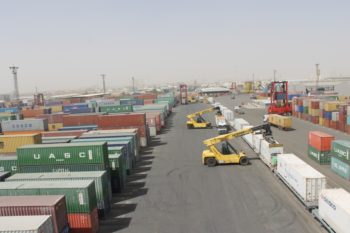
On Thursday January 4, 2018, President Muhammadu Buhari inaugurated the much talked about inland container deport (ICD) in Kaduna otherwise known as the Kaduna Inland Dry Port. For the purpose of explanation, an ICD (or dry port) is the equivalent of a seaport located in the hinterland. It receives containers by rail or road from the seaport for examination and clearance by Customs and other competent authorities. It has all the loading and off-loading equipment needed to handle containers as obtainable at the seaports. A dry port operates as a centre for trans-shipment of sea cargoes to inland destinations. The Kaduna Inland Dry Port has been touted as the first of its kind in Nigeria. While this claim may not be entirely correct as similar facilities such as the Inland Container Nigeria Limited (ICNL) in Kaduna and Kano had been established long before now, it is commendable that six other dry ports located in Ibadan, Aba, Kano, Jos, Funtua and Maiduguri, have been gazetted and are at various stages of completion as indicated by the President. The operation of these facilities is coming more than a decade after they were licensed and concessioned by government. According to the Nigerian Shippers’ Council, there are also proposals from the private sector to establish dry ports at Dagbolu in Osun State, Lolo in Kebbi State, Onitsha in Anambra State and Ogwashi-Uku in Delta State.
There is no gainsaying that the ICDs will reduce the pressure on the ports in Lagos and ultimately reduce the cost of doing business at for upcountry importers and consignees. It is common knowledge that importers pay huge sums of money to move their cargoes from Lagos by road to warehouses located in their respective states; in fact moving cargoes from Lagos to destinations outside the State could cost as high as N500, 000 and even more in some cases. It is also a known fact that many consignees are from the eastern and northern parts of the country, which buttresses the importance of functional ports in those regions.
The inauguration of the Kaduna Dry Port has again brought to the fore the need for an efficient rail system. Without an effective rail system connecting the seaports and dry ports, no progress would have been made effectively. The absence of efficient rail system means cargoes will still be transported via the bad roads to the dry port from where the importers can take delivery of their consignments. In other words, the dry ports will become underutilised and inefficient if there is no effective rail network. Indeed, this was the challenge encountered by first generation ICDs in the country.
Dry ports are naturally built around a rail system that moves cargoes from the seaports to mitigate the challenge of congestion. Therefore, as the government pushes for hinterland facilities, it is fundamental to revive rail transportation in the country and make it the first choice for freight.
It is gratifying that President Buhari has expressed commitment to changing the current tide where cargoes are mostly transported via road. During the 2018 budget presentation, the President Buhari stated that “the situation at the Apapa port complex is a top priority for this administration. The delays due to congestion and their adverse impact on business operations and costs is a key concern to our government… In addition to the road, we have also commenced the extension of the Lagos-Ibadan standard gauge rail line to connect Apapa and Tin Can Port complexes. This project will significantly ease the congestion at the ports and enhance both export and import operations. This project shall be completed by December 2018. Already, working with the private sector, we have repaired the Apapa port narrow gauge line which is currently being used to evacuate goods from the port, thereby easing congestion.”
All said, the Kaduna Inland Dry Port project is commendable and a step in the right direction. However, the government must note that there have been many projects in the country that started well but deteriorated due to poor maintenance and poor leadership. We hope this will not fall in that category.
Copyright Ships & Ports Ltd. Permission to use quotations from this article is granted subject to appropriate credit given to www.shipsandports.com.ng as the source.